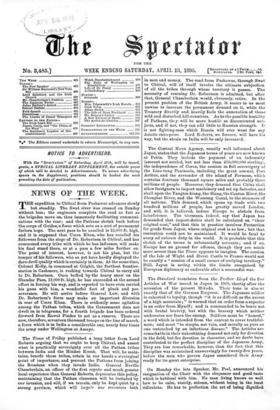The Central News Agency, usually well informed about Japan, states
that the Japanese terms of peace are now known at Pekin. They include the payment of an indemnity (amount not settled, but not less than £50,000,000 sterling', the independence of Corea, the cession in full sovereignty of the Liau-tung Peninsula, including the great arsenal, Port Arthur, and the surrender of the island of Formosa, which contains fourteen thousand square miles and probably three millions of people. Moreover, they demand that China shall allow foreigners to import machinery and set up factories, and shall open the Yangtse-kiang, the Siang, the Canton River, the Shanghai River, and the Woosung Canal, to the steamers of all nations. This demand, which opens up trade with two hundred millions of people, has greatly moved London, and will, it is believed, induce Europe to abstain from interference. The Germans, indeed, say that Japan has demanded that import-duties shall be calculated on " their original cost," and that this in practice involves Protection for goods from Japan, where original cost is so low ; but that contention could not be maintained. It would be fatal to every ad valorem duty in the world. It is probable that this sketch of the terms is substantially accurate ; and if so, Europe has no ground for offence, though they are much more severe than the Times appears to imagine. The cession of the Isle of Wight and Hurst Castle to France would not be exactly a "cession of a small corner of outlying territory." Still, Japan is acting within the limits recognised by European diplomacy as endurable after a successful war.


































